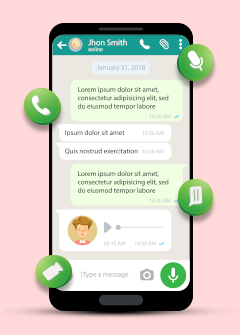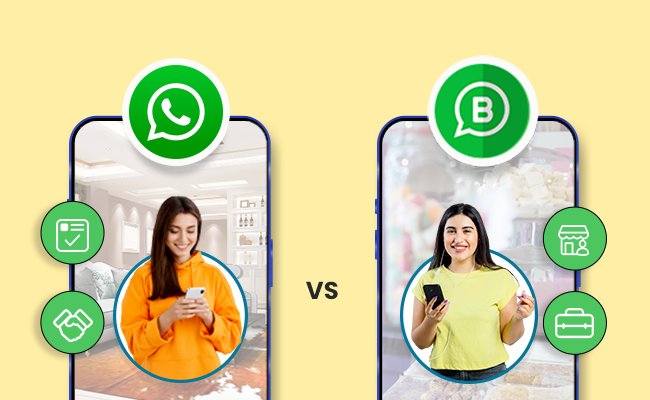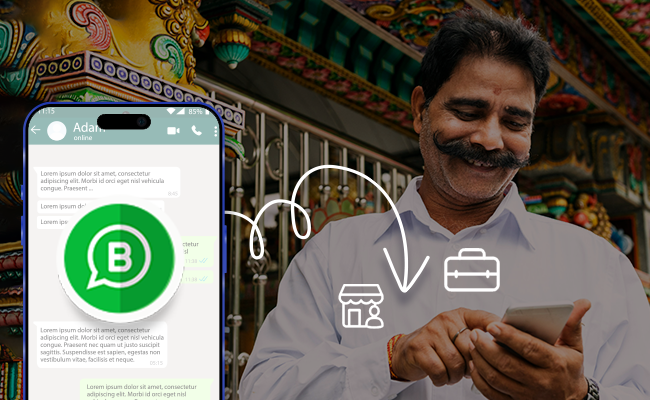The popular messaging service WhatsApp has transformed into a potent tool for commercial collaboration. Businesses increasingly use WhatsApp, which has over 2 billion monthly users, to communicate with clients, partners, and customers in a variety of ways.
WhatsApp has become the most sought-after medium for companies to offer customer care in India. Customers can simply contact companies via WhatsApp to get information, ask for assistance with issues or complaints, or request quick support.
Businesses routinely use WhatsApp to promote their products and services in an effort to boost sales. Customers can receive essential updates, notifications, and promotional materials from them. Additionally, WhatsApp gives companies the ability to organise consumer groups, send customised messages, and even conduct sales transactions directly on the app.
In this post, we will examine the differences between WhatsApp Messenger vs WhatsApp Business to determine which is the better option for providing the best possible customer service and a lot more.
What is WhatsApp Messenger?
WhatsApp Messenger, commonly known as WhatsApp, is a versatile cross-platform messaging service that has become an integral part of communication for millions of users worldwide. Owned by Facebook, Inc., WhatsApp enables users to:
- Exchange text messages
- Voice messages
- Make voice & video calls
- Share various forms of media (images, documents, & user locations)
Its user-friendly interface and broad compatibility across different operating systems make it a popular choice for personal and professional communication.
The introduction of WhatsApp Business has allowed enterprises to establish a more direct and interactive connection with their customers. Businesses can leverage features such as the MyOperator WhatsApp integration to streamline communication and enhance customer support.
The incorporation of a WhatsApp Business contact number facilitates a seamless connection between businesses and their customers, fostering efficient and convenient communication.
While WhatsApp Messenger caters primarily to personal communication needs, WhatsApp Business serves as a dedicated platform for businesses.
This differentiation is essential because it keeps the boundaries between personal and professional communications clear. Furthermore, WhatsApp Business partners gain access to valuable insights, enabling them to analyse and optimise their communication strategies.
What is WhatsApp Business?
WhatsApp Business is an additional version made just for businesses looking to communicate effectively with customers as well as employees. This is especially advantageous for small enterprises searching for an affordable messaging solution. It allows efficient connectivity with frontline workers and various groups utilising their personal devices for communication.
With WhatsApp Business:
- Gain insights for valuable data
- Optimize operations with platform features
While considering WhatsApp vs WhatsApp Business, it’s crucial for business partners to explore the best WhatsApp API gateway for business in India to enhance their communication strategies effectively.
What is the WhatsApp Business API?
The WhatsApp Business API, introduced by Facebook in 2018, is a special tool for businesses. It lets them send and receive lots of messages to people all around the world, making customer experiences on WhatsApp even better. This API is more powerful than the regular WhatsApp Business app because it allows businesses to broadcast messages to unlimited users who agreed to receive them.
WhatsApp Business API offers:
- Usage on multiple devices
- Access to set up automated notifications
- To install WhatsApp chatbots for unique features
- Verified green tick on WhatsApp
- Business messages to be delivered with clickable buttons
Overall a handy tool for enhancing business communication.
Note: It’s essential to understand the difference between WhatsApp Messenger and WhatsApp Business, especially for WhatsApp Business partners.
Business Benefits of Using WhatsApp
The business benefits of WhatsApp are countless, starting from WhatsApp business insights to discovering potential customers, and what not! Using the best WhatsApp API gateway for business include benefits like:
- Connect where customers are: With over 2 billion users, many of your customers likely use WhatsApp.
- Efficient customer support: Quick text messages on WhatsApp beat long emails, leading to faster responses and happier customers.
- Personal connections: Form a more personal bond with customers through WhatsApp, creating higher customer loyalty.
- First-mover advantage: WhatsApp is newer, offering a chance for businesses to stand out before it becomes saturated like other social media platforms.
- Marketing power: Utilise features like Broadcast Messaging to update customers on discounts, offers, and more with a personalised touch.
- WhatsApp Business Insights into customer behavior: While WhatsApp itself lacks analytics, using WhatsApp Business API with platforms like MyOperator WhatsApp provides valuable insights into customer satisfaction and behavior.
- Automated responses: Save time with automated answers to frequent questions and deploy a chatbot for more interactive customer support.
- Product Showcase: Build a detailed product catalog on WhatsApp for easy access, leading to convenient shopping for your customers.
How to get a WhatsApp API for Business with MyOperator?
To get a WhatsApp API for business with MyOperator, follow these simple steps:
- Firstly, apply and get approval for a WhatsApp Business Account.
- Connect your systems to the API using the right API client.
- Use the API to send and receive messages.
- Manage conversations efficiently.
- Keep track of important metrics for insights.
You can register for a free demo to start using the WhatsApp API and learn how it can improve client engagement. After understanding your business’s needs, MyOperator WhatsApp tech/business team will offer a customised solution.
Which Is Better, WhatsApp vs WhatsApp Business?

Let’s examine the numerous drawbacks of using WhatsApp Messenger and how WhatsApp for Business might be able to help you get past them.
1. Lack of Professionalism
Using WhatsApp Messenger for business purposes may not present a professional image to clients because it is primarily intended for personal communication. There’s a chance that it lacks a WhatsApp business helpline number or WhatsApp Business’ level of branding, customization, and business-specific features because WhatsApp Business is made with businesses in mind.
2. Limited Business Features
WhatsApp Business provides insights, and extra features like automated messages, product catalogues, and quick replies that can improve the customer support experience. Because WhatsApp Messenger lacks these features, it may be more difficult to automate and streamline customer support procedures
3. WhatsApp vs WhatsApp Business: Restricted Contacts
Businesses can only communicate with customers through WhatsApp Messenger who have added them to their contact list or who have started a conversation. This might make it more difficult to contact customers proactively or interact with new clients who haven’t added the company to their contacts
Maximize the power of real-time communication
Discover Exclusive Offers on WhatsApp

4. Limitations on Message Volume
WhatsApp Messenger has restrictions on how many users a company can send messages to at one time. This could limit the ability to communicate with many customers at once, especially during busy periods, which could affect the effectiveness of customer support.
5. Compliance and Privacy Concerns
Privacy and compliance issues may arise if WhatsApp Messenger is used for customer service. These issues relate to privacy and compliance with WhatsApp’s terms of service. WhatsApp Messenger is designed for personal communication; using it for business communications could result in compliance issues, as well as potential security and privacy risks.
6. WhatsApp vs WhatsApp Business: No Official Verification
WhatsApp Business accounts can receive official verification, proving the legitimacy and reliability of the company. For WhatsApp Messenger accounts, this verification badge is not available, which may affect customer credibility and trust.
7. Limited WhatsApp Business Insights
WhatsApp Business offers analytics and insights into customer engagement, message delivery, and customer interactions that can be used by businesses to evaluate the success of their customer support initiatives.
It may be difficult to measure and improve the performance of customer support given that these insights may not be present or may only be partially present in WhatsApp Messenger.
Now the question is which one to choose: whatsapp messenger or whatsapp for business? Do the differences between whatsapp messenger and whatsapp business stand out for you? The answer would be none of them makes the best choice for business to offer the finest services.
Whatsapp business definitely stands as a better choice compared to whatsapp messenger. But, the best choice is to integrate WhatsApp API for customer support.
WhatsApp Business Partners: WhatsApp Business vs WhatsApp API

Let’s examine the many advantages of using the WhatsApp API for customer support.
a) Convenience for Customers
Businesses can reach their customers wherever they are by integrating WhatsApp API for customer support. WhatsApp is a popular messaging platform with billions of active users.
Through WhatsApp customer service platform, a platform they are already accustomed to and at ease using, customers can communicate with businesses, making it convenient for them to engage in customer support conversations. They can even look out for WhatsApp business helpline number, which is easily available.
b) Real-time communication with MyOperator WhatsApp
Real-time communication is made possible by MyOperator WhatsApp API, allowing companies to respond quickly to client inquiries, grievances, or problems. By promptly addressing their concerns, this can enhance customer satisfaction and loyalty and result in a positive customer experience.
c) Personalised Interactions
WhatsApp API enables companies to send customised messages and give customers specialised support with WhatsApp business insights.
A more individualised and interesting customer experience, which can increase customer loyalty and retention, can be created by businesses using customer data and preferences to send targeted messages, offers, and updates.

d) Efficiency and Automation Offered to WhatsApp Business Partners
The WhatsApp API enables the automation of customer support procedures. For example, chatbots can answer frequently asked questions, offer automated responses, and gather relevant data from customers.
By reducing response times and increasing overall customer support effectiveness, this can help businesses manage high volumes of customer inquiries effectively. Are you ready to get hold of the best WhatsApp API for business in India.
e) MyOperator WhatsApp Enhanced Features
MyOperator WhatsApp API provides extra features like message templates, session messaging, and multimedia support that are specially created for businesses.
By enabling businesses to send structured messages, rich media, and interactive content to customers. These features can improve the customer support experience and lead to more interesting and productive interactions.
f) Professional Branding
Companies can project a professional image by using MyOperator WhatsApp API for customer support. Customers may feel more confident in the legitimacy and credibility of a business when it has a verified WhatsApp Business Account, which also improves customer support processes.
g) Analytics and WhatsApp Business Insights
Analytics and insights are made available to businesses by WhatsApp API, enabling them to track and evaluate customer interactions, message delivery, engagement rates, and other performance indicators.
Through data-driven decision-making and customer support strategy optimization, this can assist WhatsApp business partners in evaluating the success of their customer support initiatives.
In conclusion, Whatsapp Business and Whatsapp Messenger are two distinct versions of the popular messaging app. Whatsapp Business is specifically designed for businesses or WhatsApp business partners to engage with customers and offer features like automated messages and business profiles.
On the other hand, Whatsapp Messenger is the regular version used for personal messaging between individuals. Understanding the purpose and features of each version can help users make an informed decision on which one to use based on their needs.

In a Nutshell
- Whatsapp Business is designed for businesses to communicate with clients, offer customer care, and promote products/services.
- Whatsapp Messenger lacks business-specific features and may not present a professional image for business purposes.
- MyOperator WhatsApp Business provides branding, customization, automated messages, product catalogues, and quick replies.
- Whatsapp Messenger has limitations on contacts, message volume, compliance, privacy, and customer insights.
- Neither Whatsapp Messenger nor Whatsapp Business is the best choice for business customer support; integrating Whatsapp API offers more advantages.


